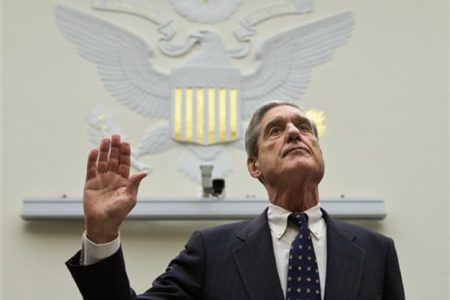What did Bob Mueller know about the FBI’s framing of four innocent men for a murder they didn’t commit, and when did he know it?
This is an important question for the “special counsel,” and for two days I’ve been emailing his press office, asking for answers about his tenure in the U.S. attorney’s office here, specifically, his time as acting US attorney in 1986-87.
No response. Zip, zero, nada.
This is a major FBI scandal, perhaps the most outrageous one in American history. The FBI railroaded four men to prison for a murder the G-men knew they did not commit, and then made sure they remained in prison for upwards of 30 years.
They (or their estates, because two of them died in prison) were eventually awarded a total of $102 million in 2007 by a federal judge for false imprisonment.
The four men were Henry Tameleo, Peter Limone, Louis Greco and Joseph Salvati. They were convicted of murdering a small-time hoodlum named Teddy Deegan in a Chelsea alley in March 1965. An FBI informant named Joe Barboza committed perjury in a state trial in 1968, to settle some old scores and protect one of his old friends, another serial killer who was the brother of another serial-killing FBI informant .
The FBI knew Barboza was lying. On March 19, 1965, one of the crooked G-men in the office, who later died in a prison hospital while under indictment for a 1981 gangland hit in Tulsa, wrote a memo to J. Edgar Hoover pointing out the names of the actual murderers of Deegan.
Yet the FBI remained silent as the four men were convicted, and then imprisoned. Two were sent to what was then Death Row.
As the years went by, it was more and more obvious that they had been framed. In 1973, a true-crime book by a Mafia associate, “My Life in the Mafia,” laid out the entire railroad. No one challenged the facts, but the men remained behind bars.
In the early 1980’s, Greco (who was in Florida the night of the murder) passed a lie-detector test on live TV. But still they were not released, in large part because the US attorney in Boston, whoever he was, continually demanded that the innocent men not be paroled.
Mueller went to work in the US attorney’s office in Boston in 1982. His boss was then US attorney Bill Weld, the future governor. On July 1, 1983, Weld wrote the following to the state Parole Board demanding Peter Limone not be released.
“This office,” Weld wrote, “recommends most strongly that the petition for commutation of Mr. Limone’s sentence be denied.”
Another letter opposing Limone’s parole was written by FBI Supervisory Special Agent John M. Morris, likewise recommending against release because “should Mr. Limone be released, he would enjoy a position of elevated status within the Boston Organized Crime Structure.”
That letter was written Jan. 27, 1983, approximately eight months after Morris had told a gangster of the identity of a federal informant against gangster Whitey Bulger, which led to the murder of two men by Bulger in South Boston in May 1982. Morris had passed on the information to a member of Bulger’s mob, another corrupt FBI agent John “Zip” Connolly. Connolly is now serving a 40-year sentence in Florida for yet another Mob rubout, in Miami.
Morris has admitted that at the time he was lobbying the Parole Board not to release the innocent men, he was accepting $7,000 in payoffs from Bulger and his partner, Stevie Flemmi. Flemmi has told the DEA that he and Bulger were paying off six FBI agents in the Boston office.
Mueller succeeded Weld as US attorney, serving from Oct. 10, 1986 until April 6, 1987.
Mueller was followed as US attorney by Frank L. McNamara, Jr., who continued the office’s policy of demanding that the innocent men not be released from state prison.
“It seems to me wrong to conclude now that Mr. Limone has been sufficiently punished,” McNamara wrote the chairman of the parole board on Sept 22, 1987. “In my judgement, Mr. Limone must be considered among the most heinous criminals being held in the Massachusetts Prison System.”
Limone, who died last year, was awarded $26 million by Judge Nancy Gertner. The federal government did not appeal the judgment.
So Mueller’s predecessor and his successor both lobbied state authorities not to release the innocent men. But did Mueller? Michael Albano, a former member of the Parole board, as well as a former mayor of Springfield, says he has seen a letter Mueller wrote about the imprisoned men.
“I saw the letter – I will take a lie-detector test, make a sworn statement, whatever,” Albano was saying yesterday. “I reviewed the Parole Board records before I testified in 2003 before the House Government Reform Committee, and there was a letter from Mueller in the files.”
In 2013, the Boston Globe also reported the existence of such a letter from Mueller.
However, the Parole Board now cannot find such a letter. I have searched the files in the state archives, where I found the letters from the other two US attorneys, as well as from the corrupt FBI agent on the Mob’s payroll. But I could find no letters from Mueller opposing the commutations or paroles.
So far, the special counsel’s office has not responded to two inquiries as to whether Mueller ever lobbied to keep the innocent men behind, despite the overwhelming evidence of their innocence, including records of the FBI, which he would eventually run for eight years.
I also inquired whether he was involved in the decisions during Weld’s tenure to demand the continuing incarceration of men who were widely known to be not guilty of the murder for which they were convicted.
So far, no answers. So let me ask him the question again publicly.
Mr. Mueller, what did you know about the framing of four innocent men for a crime they did not commit? When you were working in, and then running the office that insisted that the innocent men not be released from prison, did you ever write any letters demanding that the parole board not correct this gross miscarriage of justice.
And when did you find out that the FBI office in Boston was in the business of framing innocent men on behalf of their serial-killing, cocaine-dealing underworld paymasters?
And what exactly did you do about when you found out the extent of this unprecedented corruption in an agency you supervised for eight years?


